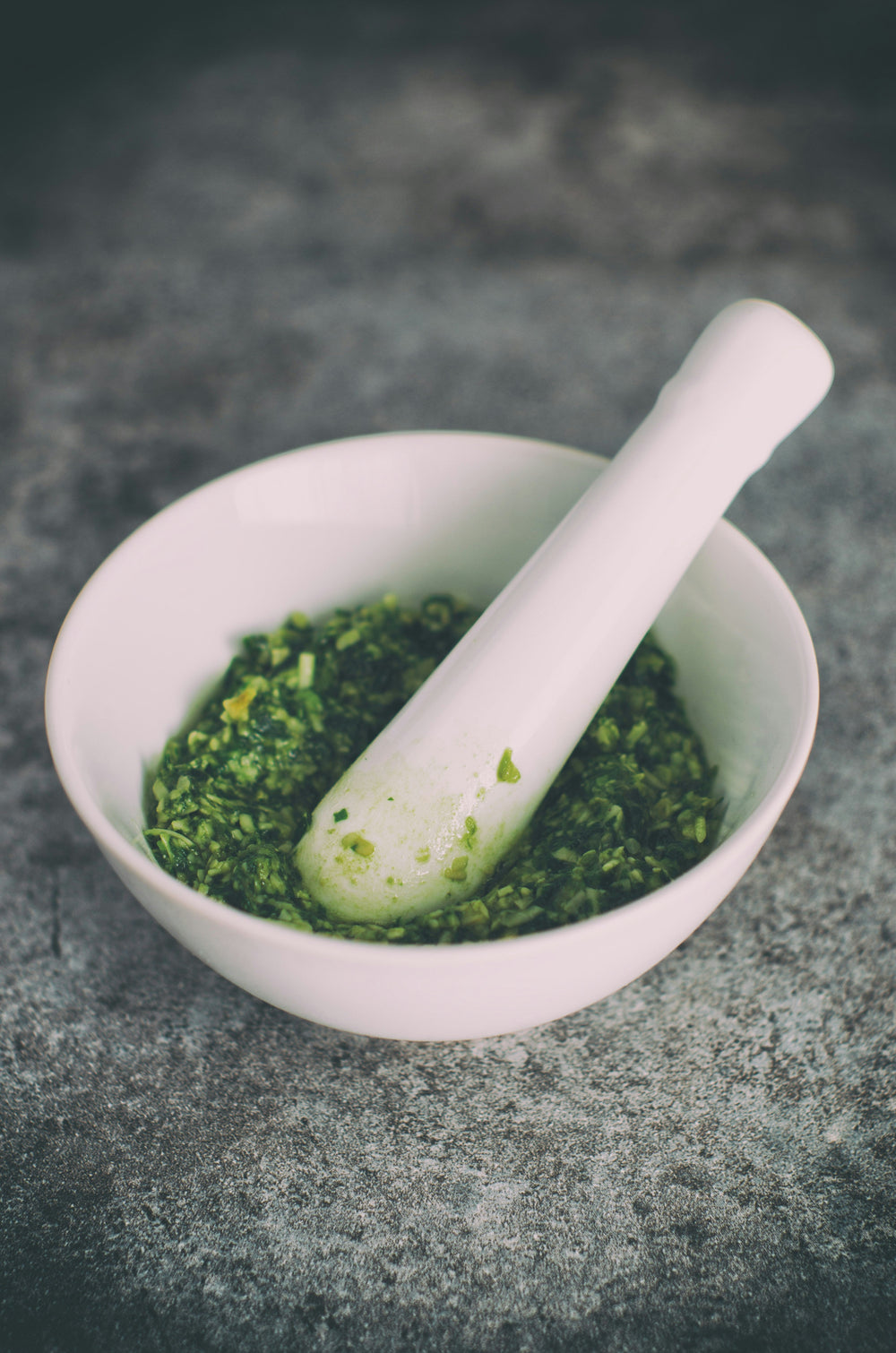This creamy green soup brings together broccoli, cauliflower, and kale for a delicious bowl that feels both comforting and energising. Finished with crispy chickpeas and toasted almonds, it is an easy way to enjoy a whole day’s worth of greens in one simple, nourishing meal.
fermented foods: a powerhouse for your gut.
The Power of Fermented Foods: How They Support a Healthy Gut From kimchi and sauerkraut to kefir and yogurt, fermented foods are making their way into kitchens around the world. But what makes them so special? More than just a trendy food, fermented foods offer numerous health benefits, especially for our gut health. What Are Fermented Foods? Fermentation is a process where microorganisms like bacteria, yeasts, or molds break down the sugars and starches in food. This process not only extends the shelf life of food but also enhances its nutritional value and creates beneficial compounds. These foods are a rich source of bioactive peptides and microbial metabolites, which have been linked to several health benefits. Some examples of fermented foods are kefir, sourdough, miso, sauerkraut, tempeh and blue cheese. How Fermented Foods Support Gut Health A Diversity of Microorganisms Each type of fermented food hosts its own unique population of microorganisms. When we eat fermented foods, some of these microorganisms survive the journey through our digestive system. These beneficial bacteria can interact with our gut microbiome, helping to support a healthy balance of gut bacteria. Rich in NutrientsFermented foods are packed with nutrients that are easier for the body to absorb. The fermentation process enhances the bioavailability of vitamins, minerals, and other beneficial compounds, making them more accessible to our body. This is especially important for gut health, as nutrients play a key role in maintaining the integrity of the gut lining and promoting healthy digestion. How to Add Them to Your Diet Add kefir to your smoothie or yoghurt – Instead of milk, add kefir into a smoothie, or mix it with yoghurt and serve with granola and blueberries for a gut-friendly breakfast Use tempeh as a protein source – This is a great alternative to meat...

The Power of Fermented Foods: How They Support a Healthy Gut
From kimchi and sauerkraut to kefir and yogurt, fermented foods are making their way into kitchens around the world. But what makes them so special? More than just a trendy food, fermented foods offer numerous health benefits, especially for our gut health.
What Are Fermented Foods?
Fermentation is a process where microorganisms like bacteria, yeasts, or molds break down the sugars and starches in food. This process not only extends the shelf life of food but also enhances its nutritional value and creates beneficial compounds. These foods are a rich source of bioactive peptides and microbial metabolites, which have been linked to several health benefits. Some examples of fermented foods are kefir, sourdough, miso, sauerkraut, tempeh and blue cheese.
How Fermented Foods Support Gut Health
-
A Diversity of Microorganisms
Each type of fermented food hosts its own unique population of microorganisms. When we eat fermented foods, some of these microorganisms survive the journey through our digestive system. These beneficial bacteria can interact with our gut microbiome, helping to support a healthy balance of gut bacteria. -
Rich in Nutrients
Fermented foods are packed with nutrients that are easier for the body to absorb. The fermentation process enhances the bioavailability of vitamins, minerals, and other beneficial compounds, making them more accessible to our body. This is especially important for gut health, as nutrients play a key role in maintaining the integrity of the gut lining and promoting healthy digestion.
How to Add Them to Your Diet
-
Add kefir to your smoothie or yoghurt – Instead of milk, add kefir into a smoothie, or mix it with yoghurt and serve with granola and blueberries for a gut-friendly breakfast
-
Use tempeh as a protein source – This is a great alternative to meat in stir-fries or salads
-
Choose fermented drinks – A refreshing way to support your gut health is to drink kombucha or water kefir; both contain live bacteria
-
Upgrade your tacos – Adding kimchi, or sauerkraut to tacos for a tangy taste
-
Add it in your coleslaw – The easiest way to try sauerkraut is mixing it in your coleslaw
-
Add to your dressing or marinade – Using miso in your salad dressing or marinade for your protein can add an umami flavour to your dish
Conclusion
From fermented vegetables to dairy-based products and drinks, there's something for everyone. Whether you enjoy a tangy scoop of sauerkraut, a glass of kombucha, or a dollop of kefir, by adding a variety of fermented foods to your diet, you’re giving your gut the support it needs to stay balanced and healthy.
References:
-
Leeuwendaal, N. K., Stanton, C., O'Toole, P. W., & Beresford, T. P. (2022). Fermented Foods, Health and the Gut Microbiome. Nutrients, 14(7), 1527. DOI: 10.3390/nu14071527
-
Valentino, V., Magliulo, R., Farsi, D., Cotter, P. D., O'Sullivan, O., Ercolini, D., & De Filippis, F. (2024). Fermented foods, their microbiome and its potential in boosting human health. Microbial Biotechnology, 17(2), e14428. https://doi.org/10.1111/1751-7915.14428
lifestyle. gut health recipes.
ready in 10 minutes
herb-whipped cottage cheese chicken bagels.
These basil whipped cottage cheese protein bagels make a fresh, high-protein breakfast or lunch, combining creamy herb-blended cottage cheese with juicy chicken, rocket, and tomatoes. They’re quick to assemble, packed with flavour, and perfect for a nourishing breakfast or light lunch.
ready in 10 minutes
kiwi chocolate protein chia pots.
These Kiwi Chocolate Protein Chia Pots make an ideal high-fibre, high-protein breakfast that keeps you full and energised all morning. They’re quick to prepare, easy to store, and perfect for a healthy grab-and-go option.
ready in 15 minutes
spiced apple porridge.
This spiced apple and pumpkin seed porridge is a warming, high-fibre breakfast that’s perfect for cosy mornings. Made with creamy oats, gently caramelised apples and a crunchy pumpkin seed topping, it’s ready in just 15 minutes and serves one.
ready in 50 minutes
prep-ahead baked blueberry oats.
These prep-ahead oven-baked oats with blueberries and bananas are rich in protein and fibre, making them a nourishing, gut-friendly breakfast to enjoy all week.
ready in 15 minutes
spicy green eggs with feta.
These spicy green eggs with feta are a quick, protein-rich recipe packed with gut-friendly ingredients like spinach, courgette, and spring onion. Baked in the oven or air fryer, they’re simple to make, full of flavour, and support digestion with a balance of fibre, protein, and healthy fats. Perfect for breakfast, brunch, or a light meal, this vibrant dish proves that nourishing your gut can be both delicious and easy.
ready in 10 minutes
egg wrap with pesto.
Bright, fresh, and ready in just 10 minutes, this flavour-packed wrap serves one and is ideal for breakfast, lunch, or any time you’re after something simple yet filling.
ready in 10 minutes
peach cobbler overnight oats.
Start your day with a gut-friendly twist on a classic dessert. The peach cobbler overnight oats serve 2–3 and takes just 10 minutes to prepare the night before. Packed with fibre, flavour and feel-good ingredients, it’s the perfect make-ahead option for busy mornings or a nourishing snack you can enjoy any time of day.
ready in 15 minutes
smoky egg salad bagel crunch.
This smoky harissa egg bagel is the perfect 15-minute meal. Made with creamy Greek yoghurt, tangy pickles, and a hint of spice, it’s a high-protein twist on classic egg salad that delivers on both taste and texture. Ideal for busy days, this easy bagel recipe makes lunch feel gourmet without the effort.
ready in 20 minutes
chewy breakfast matcha protein cookies.
Soft, satisfying, and subtly sweet—these breakfast cookies are made to fuel your morning the right way. With fibre-rich oats, plant-based protein, and antioxidant-packed matcha, they’re a gut-friendly grab-and-go option that doesn’t compromise on flavour or function.
ready in 15 minutes
lemon & poppy seed pancakes.
Emily's light, gut-friendly crêpes are the perfect balance of fibre, protein, and healthy fats to support digestion and keep you feeling great.
ready in 10 minutes
carrot cake breakfast oats.
Start your day with a delicious and nutritious breakfast option - Carrot Cake Oats. Filled with fibre diversity to promote healthy digestion.










































